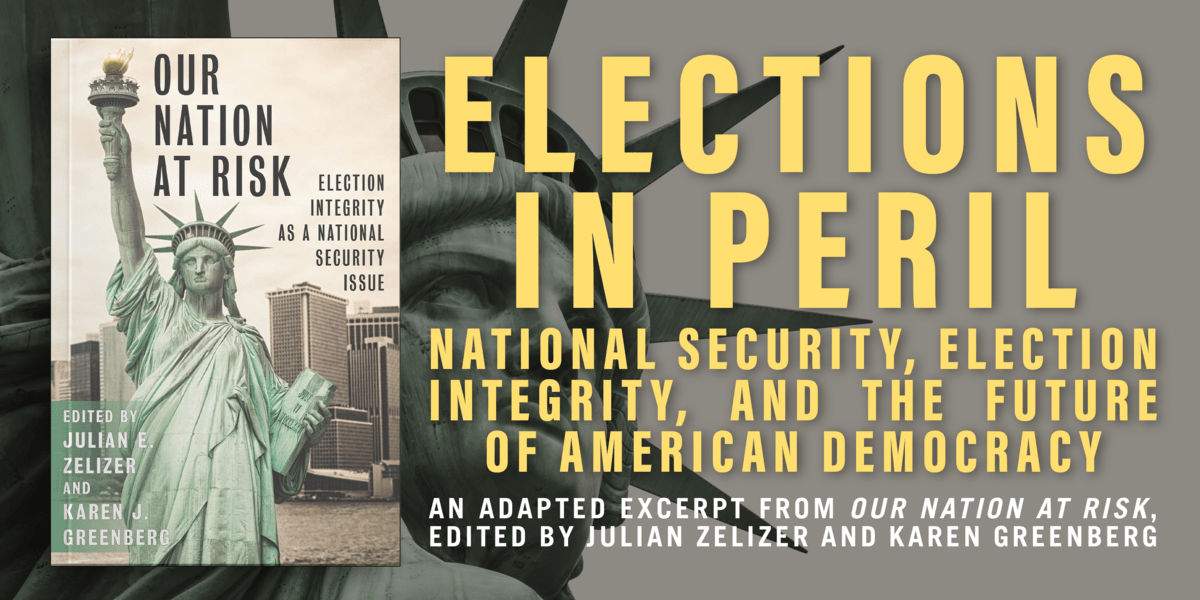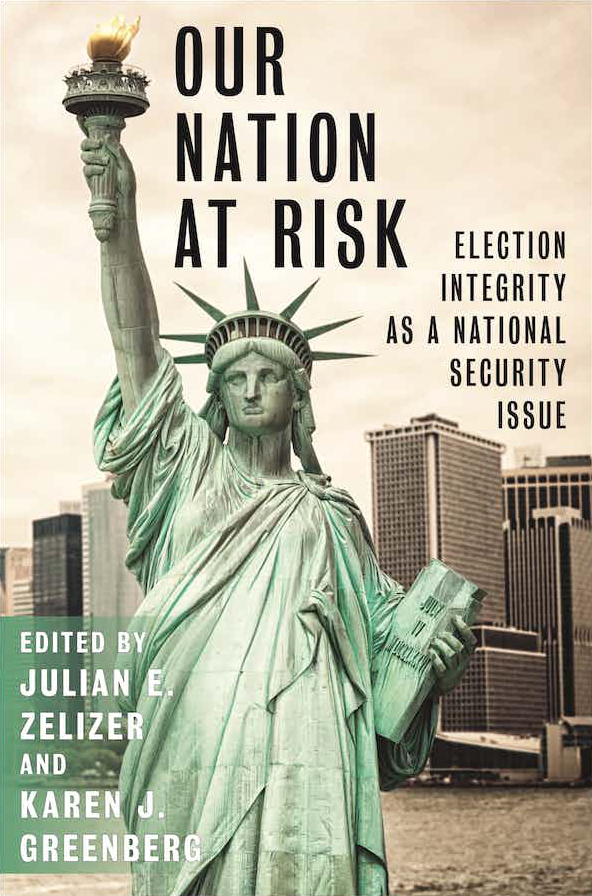An adapted excerpt from Our Nation at Risk, edited by Julian Zelizer and Karen Greenberg
As the 2024 election season hits full stride, we as a nation know one thing: Our election system is not secure. Moreover, its insecurities exist on many levels. The attack on the US Capitol on January 6, 2021, was indeed a wake-up call, sounding its warning that the time has come to address weaknesses, both old and new, that threaten the security of our elections This election season will no doubt further test the frailty of the system while at the same time looking to recent reforms to strengthen the nation’s trust in the outcome.
While the candidacy of former president Donald Trump, who instigated the Capitol attack, threatens a pressing dimension of incipient danger, what we learned from the 2020 election and its aftermath is that that our electoral system itself is fraught with peril, posing an existential risk to our democracy. Not only did powerful forces in American politics, including the president of the United States, display a willingness to challenge and subvert the basic operations of the democratic process, and not only did the nation discover that there were many ways that this could be achieved, but the country learned in an unforgettable manner that the protections in place for our elections are searingly vulnerable. “To cast a vote in the United States of America is an act of both hope and faith. When you drop that ballot in the ballot box, you do so with the confidence that every person named on that ballot will hold up their end of the bargain,” warned the congressional committee that investigated the events of January 6. “The person who wins must swear an oath and live up to it. The people who come up short must accept the ultimate results and abide by the will of the voters and the rule of law. This faith in our institutions and laws is what upholds our democracy. If that faith is broken—if those who seek power accept only the results of elections that they win—then American democracy, only a few centuries old, comes tumbling down.”
The danger posed by election denialism was not simply that it could take hold over one of the nation’s major political parties but that there were accessible ways to achieve the goal of declaring an election’s outcome illegitimate. The constitutional system on which we rely to determine who will be our president has multiple points of vulnerability that can be manipulated, exploited, and weaponized, despite long-standing efforts to implement safeguards. Layered on top of the process is a communications environment where misinformation and disinformation—from at home and abroad—easily permeate the ecosystem on which we depend to understand the outcomes of democratic contests. While it is true that the election of 2020 ended with the rightful person in office, largely as a result of individuals who refused to interfere with lawfully cast and counted votes, the potential for an illegitimate outcome remains.
Had Vice President Mike Pence made a different decision on January 6, yielding to the pressure of the president and his counsel to delay counting the votes, or if one state official in Michigan or Wisconsin had moved forward in sending an alternative slate of delegates, it is not difficult to imagine how Donald Trump might still be sitting in the Oval Office.
This is not the first time that our democracy has been under threat. The worst moment took place during the nineteenth century, when the political system proved incapable of resolving the immense divisions that emerged over the institution of slavery and disintegrated into a devastating civil war that almost destroyed the republic. The promise of Reconstruction was undone by organized Southern white violence and a deal struck after the contested presidential election in 1876 that was part of the dismantling of the ambitious federal programs that had been put into place by Northern Republicans. During the early twentieth century, the Deep South put into place Jim Crow laws that fundamentally undercut efforts to broaden political rights and create a truly democratic system that offered representation to all citizens regardless of their race. It took a grassroots movement and a sympathetic president to enact the Voting Rights Act (VRA) of 1965 that finally brought the muscle of the federal government to bear in service of protecting every American’s right to vote. When a Republican Senate and president agreed to reauthorize and extend the reach of the legislation in 1982, it appeared that the VRA had entrenched a new era in which the right to vote would retain newfound strength within American political culture. But the election of 2000, in which the Electoral College winner lost the popular vote, and in which a close election led to the Supreme Court deciding the election, ushered in a whole new set of problems hindering trust in the democratic process and put into motion a number of initiatives that aimed to improve election administration. In 2013, the Supreme Court knocked down Section 5 of the VRA and helped open the door to state efforts that put into place new kinds of restrictions—not explicitly racial but often falling hardest on Black and Latino communities—that became the center of political battles over democratic rights. “Beyond question,” Justice Ruth Bader Ginsburg wrote in her dissent, “the V.R.A. is no ordinary legislation. It is extraordinary because Congress embarked on a mission long delayed and of extraordinary importance: to realize the purpose and promise of the Fifteenth Amendment For a half century a concerted effort has been made to end racial discrimination in voting. Thanks to the Voting Rights Act, progress once the subject of a dream has been achieved and continues to be made. The court errs egregiously by overriding Congress’s decision.” Despite the fact that the nation has been able to overcome moments of vulnerability in our history, the survival of the system in the past is not evidence that a fragile democracy will always endure. January 6 was so perilous, taking place in an era where autocratic forces in other countries have been eroding democratic politics, that it has forced the nation into a reckoning with the threats that the security of our electoral system faces.
In the 2020s, we have clearly entered into a new moment of political instability. While other Western democracies are also confronting unprecedented challenges to fair and just elections, the full array of dangers here at home is uniquely threatening. The nation can’t afford to continue in this way. Presidential and congressional elections determine the future. With each election comes the promise and the peril of change. Domestic policy, foreign affairs, economic viability, and safety in our streets are but a few of the realities of life that the country’s leadership stands to affect.
The definition of national security must take into account the challenges that are posed to our free and fair elections, the bulwark that we depend on to prevent authoritarian forces from gaining a strong hold in the United States. Whereas many of the national security risks we have focused on stem from external sources—such as authoritarian governments in Europe or nonstate terrorist networks—it has become increasingly clear that some of the most serious challenges stem from within. Indeed, the two threats are interconnected. Not only do foreign adversaries seek to capitalize on the nation’s political instability, but the vulnerabilities themselves offer avenues for overseas actors to influence our process.
This is the subject of our book. Our Nation at Risk brings together some of our leading political scientists, historians, law professors, and journalists to address the biggest vulnerabilities that our election system faces and to provide numerous recommendations to fix it. The chapters take seriously Benjamin Franklin’s famous admonition to Elizabeth Willing Powel, who asked, “Well, Doctor what have we got, a republic or a monarchy?” to which he responded, “A Republic, if you can keep it.” Whereas just a decade ago most Americans would have agreed that we can automatically keep it, today we know that maintaining democracy requires substantive institutional reforms that can provide stability and predictability to the mechanisms through which we make our decisions. While the lessons of the past helped lay the groundwork for recent abuses, they also shine a light on remedies available for more robust, secure, and trusted elections. This volume tries to offer pathways toward making ure we can keep our republic. The 2024 election will take us one step further to understanding the vulnerabilities of our system- the continuing impact of weakened voter protections, the prospects for violence and disinformation, as well as the unprecedented reality of a convicted felon running for office. It also holds the possibility of proving the strength of heightened protections, from new and yet-to-be-tested defenses against cyber threats, AI and foreign interference to safety at the polls. This book, like the elections themselves, offers a window into what we’ve seen, what we can expect – and reforms that can help the nation strengthen a democracy which has come under continual strain and threat.
Election security and our national security go hand in hand. All the weapons in the world and all of the best defense systems won’t protect us if the core of the democracy is broken. With this book, we offer a path to achieving a better republic—sooner rather than later.
Julian E. Zelizer is the Malcolm Stevenson Forbes, Class of 1941 Professor of History and Public Affairs at Princeton University. He is the award-winning author and editor of 25 books including The Fierce Urgency of Now: Lyndon Johnson, Congress, and the Battle for the Great Society and Burning Down the House: Newt Gingrich, The Fall of a Speaker, and the Rise of the New Republican Party.
Karen J. Greenberg is the Director of the Center on National Security at Fordham Law. She is the author and editor of many books, including The Torture Papers: The Road to Abu Ghraib, Subtle Tools: The Dismantling of American Democracy from the War on Terror to Donald Trump, Rogue Justice: The Making of the Security State, and The Least Worst Place: Guantanamo’s First One Hundred Days.



 What Makes a Story by Michael Bérubé
What Makes a Story by Michael Bérubé